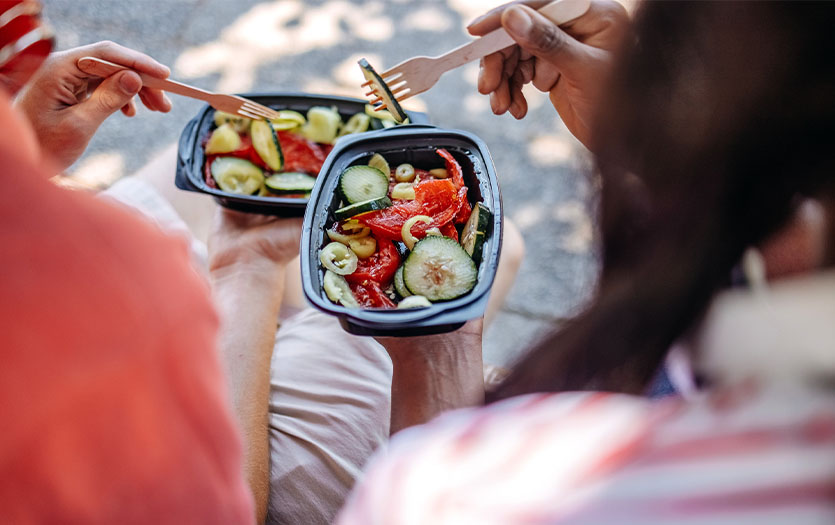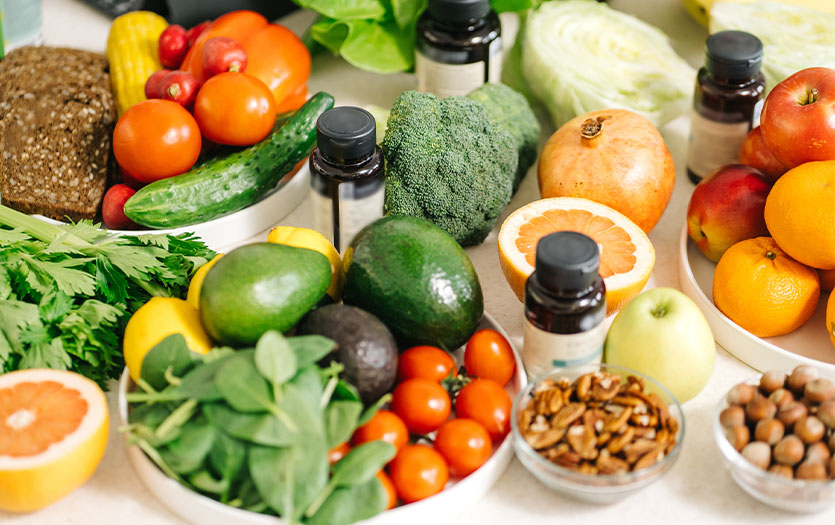
This post was written by Briana Aspy, PA, PPG – Integrative Medicine.
Imagine your gut as a busy metropolitan city filled with businesses and factories run by trillions of microbial residents known as the gut microbiome. They all work together to support your body's many essential functions. But just like any city, the health of this ecosystem depends on what you feed it.
In recent years, science has continued to confirm just how deeply our nutrition influences gut health. We now understand that it isn't just about taking probiotic supplements and avoiding junk food. Targeting your nutrition for gut health can fuel a complex metabolic network that nourishes your entire body.
The good news? Small changes over time can offer big results. By making a few mindful choices and changes at a time, your gut will love you back every step of the way.
Foods that support a healthy gut
There are plenty of delicious, accessible foods that can help your gut flourish.
Fiber-rich foods. Fiber is the fuel your gut bacteria love most. When you eat fiber, your microbes ferment it into short-chain fatty acids that nourish your gut lining, reduce inflammation and support immune function.
Despite its importance, most people struggle to get enough fiber daily—the average American consumes only about 16 grams of fiber per day, far below the recommended levels. According to the Dietary Guidelines for Americans (2020–2025), here's how much fiber adults should aim for each day:
Women
-
Ages 19–30: 28 grams
-
Ages 31–50: 25 grams
-
Ages 51+: 22 grams
Men
-
Ages 19–30: 34 grams
-
Ages 31–50: 31 grams
-
Ages 51+: 28 grams
To meet these goals, include more of the following fiber-rich foods in every meal:
-
Unprocessed whole grains: oats, quinoa and barley
-
Legumes: lentils, black beans, chickpeas and split peas
-
Fruits: berries, apples, pears, raspberries and bananas
-
Vegetables: broccoli, carrots, Brussels sprouts and leafy greens
You can also boost your fiber intake by sprinkling chia seeds, flaxseeds, or hemp hearts into smoothies, yogurt or soups.
Fermented foods. Fermented foods are rich in probiotics or live beneficial bacteria that can help restore balance in your gut microbiome. This includes:
-
Yogurt with live cultures
-
Kefir, a tangy fermented milk drink
-
Sauerkraut and kimchi
-
Miso and tempeh
-
Kombucha (fermented tea)
Prebiotic foods. Prebiotics are types of fiber that feed the good bacteria already living in your gut. Think of these familiar sources of prebiotic fiber as fertilizer for your microbiome:
-
Garlic and onions
-
Leeks and asparagus
-
Bananas (especially slightly green ones)
-
Jerusalem artichokes
-
Chicory root
Polyphenol-rich foods. Polyphenols are plant compounds with antioxidant properties that also support microbial diversity. Great sources of polyphenols are:
-
Berries (blueberries, raspberries)
-
Green tea
-
Dark chocolate (70% cocoa or higher)
-
Olive oil
-
Red grapes
Healthy fats. Omega-3 fatty acids help reduce inflammation and support the integrity of the gut lining.
-
Wild-caught fatty fish: salmon, mackerel, anchovies, sardines and herring. Use the acronym SMASH for easy recall.
-
Flaxseeds, hemp hearts and chia seeds
-
Walnuts
-
Algae-based supplements
Hydration. Water helps everything move smoothly through your digestive tract and supports the mucosal lining of your intestines. Aim for 8–10 cups of water daily and consider herbal teas as a gut-friendly alternative to sugary drinks or juices.
Avoid foods that can harm gut health
Just as some foods help your gut thrive, others can disrupt the delicate balance of your microbiome. These foods may promote the growth of harmful bacteria, increase inflammation or damage the gut lining.
Ultra-processed foods. These are often high in additives, preservatives and emulsifiers, which can negatively affect gut bacteria and increase intestinal permeability (leaky gut). Additionally, high intake of red and processed meats has been linked to reduced microbial diversity and increased inflammation. Consume these foods sparingly:
-
Packaged snacks: chips, cookies, crackers, cereals and processed grains
-
Instant noodles and frozen meals
-
Processed meats: hot dogs, sausage, deli meats, bacon, jerky and other cured meats
-
Large portions of steak or burgers
-
Sweetened breakfast cereals
Refined sugars and artificial sweeteners. High sugar intake can feed harmful bacteria and yeast, while some artificial sweeteners like sucralose and aspartame may reduce beneficial bacteria. Try to limit items like:
-
Soda, energy drinks and other sugary beverages
-
Candy and baked goods
-
Sugar-free gum and diet sodas
Alcohol. Excessive alcohol can damage the gut lining and alter the microbiome, leading to inflammation and digestive issues.
Low-fiber diets. Diets lacking in plant-based fiber starve your beneficial bacteria, leading to a less diverse and less resilient microbiome. This occurs when meals depend heavily on processed foods and don't include a variety of fruits, vegetables or whole grains.
Lifestyle tips to support gut health
Nutrition is foundational, but your lifestyle also plays a significant role in gut health. Here are a few supportive habits to consider:
-
Manage stress. Chronic stress can disrupt the gut-brain axis and alter your microbiome. Practices like meditation, deep breathing and journaling can help.
-
Prioritize sleep. Poor sleep is linked to reduced microbial diversity and increased inflammation. Aim for 7–9 hours of quality sleep per night.
-
Move your body. Regular physical activity supports a more diverse and resilient microbiome. Even a daily walk can make a difference.
-
Use antibiotics wisely. Sometimes antibiotics are necessary. However, they can also wipe out both good and bad bacteria. Only use them when prescribed and consider taking probiotics afterward to help restore balance.
Final thoughts
Our day-to-day choices really do matter, especially when it comes to meals, snacks, hydration and lifestyle practices. These habits communicate with your body at a cellular level. Speak your body's love language by making good, healthy choices one step at a time. You don't need to overhaul your diet and lifestyle overnight. Start small, celebrate your wins along the way, and keep building on your progress.
Add a serving of fermented food to your lunch. Swap white rice for quinoa. Sip green tea instead of soda. Take your first step towards better health. These little changes add up—and your gut will thank you.
For more information about nutrition and gut health or to learn more about the services offered at Parkview Physicians Group – Integrative Medicine, please visit our website here. To schedule a new patient appointment and establish care with one of our providers, call our office at 260-672-6590.



